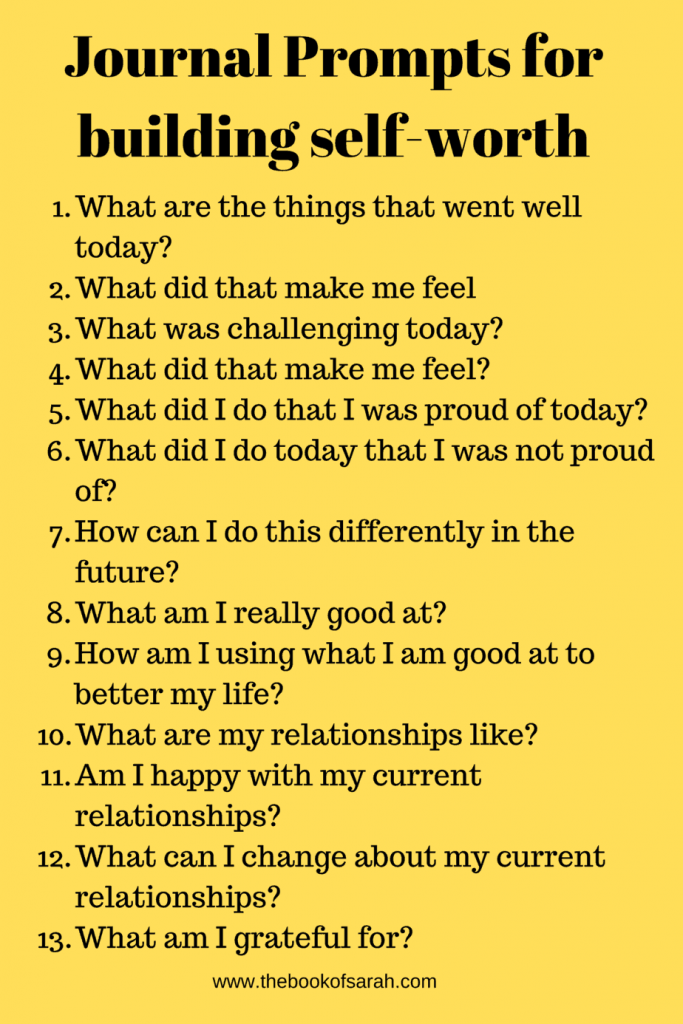How to build and improve self-worth and self-esteem
Contents
Meaning and definition of self-worth
Where does self-worth come from?
Where does low self-worth come from?
What is Self-worth in psychology?
Self-worth and self-confidence
How to build self-worth in your daily life
Signs that you are struggling with self-worth
Meaning and definition of self-worth
Self-worth is used interchangeably with self-esteem and sometimes self-respect. It is the value one places on herself.
Where does self-worth come from?
 People derive self-worth from different things. However, our internalized self-worth comes from our childhood. In early childhood, an interaction of a child with the mother and father can influence their childhood.
People derive self-worth from different things. However, our internalized self-worth comes from our childhood. In early childhood, an interaction of a child with the mother and father can influence their childhood.
If a child is loved, they grow up thinking and knowing that they are worthy. If a child is abused and neglected, they grow up they are not deserving of love and attention.
As we grow older, we derive self-worth from our interactions. For example, a person with good friends and a good relationship with a significant other is likely to feel a deep sense of self-worth.
They believe that they are loved and valuable. The opposite happens when someone is in a toxic relationship. For example, a woman in an abusive relationship loses their self-worth the longer they stay in the relationship. The more she is told that she is not worthy, beautiful, smart, she starts to believe it and her self-worth declines.
 As humans, it is in our nature to want to feel loved, valued, respected and treated well. When the events and the people around you present these positive attributes, you develop self-worth. We feel that we are worth because you have been put in an environment that makes you feel so.
As humans, it is in our nature to want to feel loved, valued, respected and treated well. When the events and the people around you present these positive attributes, you develop self-worth. We feel that we are worth because you have been put in an environment that makes you feel so.
All the same, it is not healthy to place all our worth in the people and events around us. What happens when tomorrow you wake up and lose your nice job, nice house, nice friends and a nice family?
What happens to your self-worth? The best thing is to learn to value ourselves not based on external events and belongings, but intrinsically. It’s important that we shift our locus of control internally and not externally.
This means that we believe we have control over what happens to us and our worth is not determined by the things we have. This way, we believe more in our abilities, attitudes and our internal strengths to get us out of tough situations.
Where does low self-worth come from?
 Low self-worth comes from different sources. First, no one is born with low self-worth. No one is born believing that they are not enough. I watched this interview with a therapist at Impact Theory where a therapist said that people come to her with one common problem, that they are not enough.
Low self-worth comes from different sources. First, no one is born with low self-worth. No one is born believing that they are not enough. I watched this interview with a therapist at Impact Theory where a therapist said that people come to her with one common problem, that they are not enough.
This is having low self-worth. She mentions that no one is born feeling this way. No baby thinks that they will not poop or drool since they are not worth and they don’t deserve to be changed and made comfortable.
However, as we grow up, how the people around us treat us can make us think we are not worthy. For example, once a child starts to become aware and realize that they are hurt or neglected every time they soil themselves and they are shown that it is a bad thing to do, they start to realize that maybe they shouldn’t be doing so.
 They start not to call for attention when they need changing because well, calling for attention comes with pain. The older a child grows and they notice neglect or abuse, their self-worth decreases. A child that is not paid attention to will likely not ask for anything because they don’t feel deserving enough to get it.
They start not to call for attention when they need changing because well, calling for attention comes with pain. The older a child grows and they notice neglect or abuse, their self-worth decreases. A child that is not paid attention to will likely not ask for anything because they don’t feel deserving enough to get it.
If for example, you were constantly told that you need to deny yourself something so your sibling can have it, your self-worth starts to depreciate (let not this be confused with teaching a child to share). If a parent shows (or tells) you that you are a burden and unwanted, you start to believe so. Your self-worth goes on depreciating.
It’s, therefore, safe to say that low self-worth is developed from our environment and interactions. When we are not nurtured, we start to believe that we are not worthy of good things and believe that we cannot achieve anything.
In the event of a school-going child or a teenager, if they fail in class or fail to grasp something that they’re taught quick enough, and their teacher or parent shows them that they are dumb because of this, they develop low self-worth. They start to believe that they are not good enough and they never will be. They make statements such as ‘
I am dumb and no amount of teaching will make me understand anything’. Their decreasing self-worth starts to spread in other areas such as their looks, their relationships and with time, they believe they are not good at anything at all.
What determines self-worth?
 Determinants of self-worth differ in different people. As I mentioned earlier, events in our lives can improve our self-worth. For example, a good job, a good relationship, good friends and good social status can boost our self-worth.
Determinants of self-worth differ in different people. As I mentioned earlier, events in our lives can improve our self-worth. For example, a good job, a good relationship, good friends and good social status can boost our self-worth.
However, basing our self-worth on these things can be dangerous. If you lost all that you have, would you survive? If you base your self-worth on the things you possess, you are treading on a dangerous path.
Basing your self-worth on your appearance, for example, is a common determinant of self-worth in many people. You tend to believe that you are as good as you look. There is nothing wrong with looking great, but who are you without how you look? What if you lost it all tomorrow?
The best determinants of self-worth are factors that you can control. You can control yourself. In the book Man’s search for meaning, Victor Frankl discusses how you can find meaning when you have lost everything.
Think about it, when a successful psychologist loses it all, his livelihood, his family and his freedom, what happens to his self-worth. Though it is not easy, Frankl found meaning in spite of all that he lost.
We can say that material things do boost your self-esteem, but are they the measures of your self-worth? Are you worth your job, your money, your car, and your house or looks?
Can you develop self-worth?
 You can develop self-worth. Even if you experienced events in your childhood that damaged your self-worth, you can rise from this and develop self-worth. This starts with self-awareness. Self-awareness involves exploring yourself, your identity, childhood, and personality.
You can develop self-worth. Even if you experienced events in your childhood that damaged your self-worth, you can rise from this and develop self-worth. This starts with self-awareness. Self-awareness involves exploring yourself, your identity, childhood, and personality.
It involves looking at how your childhood has affected the person you are today. You need to come into terms with the events of your childhood for you to rise past them.
For example, a woman whose father walked away when she was young is likely to carry this in their life, sometimes unknowingly and subconsciously. They believe that they are not worthy since the person who is supposed to love and protect them walked away.
Unknowingly, this can damage her relationship with men. She thinks that she is not deserving of the love of a man. She can also tend to view the men in her life as unreliable and develop trusting issues.
Another self-worth example is a child that was constantly told that she is not smart enough. This kind of thinking goes on in her life to the extent that she can hurt her work ethic. She can think, ‘well, why try?’ I am not smart enough. Even if I try I will always fail and the smart ones will always win.
How to develop self-worth
Self-awareness
 This being said, self-awareness can help you confront these teachings you received in your childhood and unlearn some thoughts and beliefs. You can do this with the help of self-awareness exercises or with a therapist. My friend developed some questions to help you with self-awareness. Addressing your past can help you heal from it.
This being said, self-awareness can help you confront these teachings you received in your childhood and unlearn some thoughts and beliefs. You can do this with the help of self-awareness exercises or with a therapist. My friend developed some questions to help you with self-awareness. Addressing your past can help you heal from it.
Changing your mindset
 Changing your mindset from a fixed mindset to a growth mindset can help you develop self-worth. Having a fixed mindset is when you believe that things are just the way they are and they cannot improve. You believe that you are dumb; you are not beautiful; you are not worthy of anyone’s time.
Changing your mindset from a fixed mindset to a growth mindset can help you develop self-worth. Having a fixed mindset is when you believe that things are just the way they are and they cannot improve. You believe that you are dumb; you are not beautiful; you are not worthy of anyone’s time.
Having a growth mindset, on the other hand, helps you learn that nothing is fixed. Abilities are not fixed. If you think that you are not intelligent enough to learn something new, a growth mindset teaches you that you can learn anything you put your mind into. You start to believe that nothing is stationary and you can always change the situation.
Improving yourself
 Another way you can develop self-worth is by working on improving yourself. If you feel that you are not worthy of getting a certain job, why not learn some of the skills you need to get that job? If you believe you are not educated enough to attempt a certain project, why not educate yourself?
Another way you can develop self-worth is by working on improving yourself. If you feel that you are not worthy of getting a certain job, why not learn some of the skills you need to get that job? If you believe you are not educated enough to attempt a certain project, why not educate yourself?
This may not necessarily involve going to school and taking up a 4-year degree (although you may do that as well), but you can educate yourself through self-education. You can start to read a book in the area you want to grow in or take online courses in this area.
A lot of people are proficient in certain areas because they obtained the skills through self-education. These skills are self-taught. They took the initiative to learn what they needed to become better in their areas.
Self-worth in relationships
 One of the main areas that people struggle with self-worth is in relationships. A lot of people stay in the wrong relationships since they have low self-worth.
One of the main areas that people struggle with self-worth is in relationships. A lot of people stay in the wrong relationships since they have low self-worth.
They don’t think they deserve to be treated better. They think another and an even better person can not love them. They hold on to their current relationships, no matter how bad it is since they don’t think they deserve any better.
Recently, a friend and I had a conversation about how much we didn’t know of our self-worth in past relationships. We tried so hard in the relationship while the other party was not trying at all.
We also thought we were not worthy and accepted any time of treatment fearing that if we rebelled, the other person would leave us. Living in fear in a relationship and walking on eggshells all the time is a sign of low self-worth.
When you know your worth, you realize that you are a valuable member of this relationship. You are not the only person that is lucky to have the other person, they are also lucky to have you.
You are lucky to have each other. Having high self-worth helps set a standard of how you need to be treated. If someone is rude or verbally abusive to you, you can stand up to them and say, ‘no, you should not talk to me like that, it is not ok’.
When you have high self-worth, you don’t have to say it out loud. The other person can tell how much you value yourself. They can tell from the way you carry yourself and will treat you with respect.
People with high self-worth realize that if and when a relationship falls apart, it’s not because they were not worthy of a good relationship. The relationship fell apart because it was not right.
They don’t personalize the failure but take it as part of life. I discussed the personalization of events in 3 thoughts that can transform your life.
People with high self-worth set healthy boundaries within their relationships. They hold themselves responsible for their own emotions and do not expect the other persons to sense their needs and make them feel better. A high self-worth person knows what they want and what they don’t want.
Self-worth and depression
 Can low self-worth lead to depression? Yes! When your self-worth is low, your sense that you are not enough increases. You believe that you are not worthy of love. You withdraw from others and isolate yourself. You sink into self-pity and avoid situations that will expose how you are feeling.
Can low self-worth lead to depression? Yes! When your self-worth is low, your sense that you are not enough increases. You believe that you are not worthy of love. You withdraw from others and isolate yourself. You sink into self-pity and avoid situations that will expose how you are feeling.
Depression is caused by prolonged sadness, emptiness and apathy. You lack interest in what’s happening around you, lack enthusiasm in life and lack of concern for yourself and others.
Someone who is going through a painful breakup, separation or divorce, for example, will feel their self-worth dropping. They can feel as if the failure of their relationship and marriage means that they have failed as a person.
When they feel like a failure, they avoid others as they don’t feel confident enough to face others who are seemingly happy. This loss that has happened in their life denies them interest and enthusiasm with life.
The more they withdraw and wallow in self-pity, the more their self-worth is punctured, and the more depressing they become.
Importance of self-worth
What good does self-worth bring in our lives? Why is it important that you find your self-worth and develop self-worth?
Congruence
 Congruence happens when your self-image is similar to the ideal image you have of yourself. This means that if you have a high image of yourself, we are close to our ideal self. As a result, we feel more satisfied with our lives.
Congruence happens when your self-image is similar to the ideal image you have of yourself. This means that if you have a high image of yourself, we are close to our ideal self. As a result, we feel more satisfied with our lives.
This way, you can be your true self and present yourself as you are to the world. People with low self-worth use defense mechanisms or layers of neurosis when presenting themselves to the world. They play a certain character because they are not confident with who they are and choose instead to adopt a character to show to others.
Playing a character can be exhausting and often this may lead to depression since you can only keep up a character for so long.
Self-worth helps us actualize and live to our potential
 We are the best expert about ourselves. If we believe we can, then we can and if we believe we can’t, no one can convince us that we can. The value we place on ourselves can help us actualize.
We are the best expert about ourselves. If we believe we can, then we can and if we believe we can’t, no one can convince us that we can. The value we place on ourselves can help us actualize.
High self-worth gives us the confidence to go for what we want. We get more confidence to enroll for a course and complete it. We get the confidence to start a project and finish it.
We get the confidence to get into a relationship and sustain it. According to Carl Rogers, an individual who is actualizing is a fully functioning person.
Developing healthy relationships
 When you know your value and your worth, you attract people with whom you can form healthy relationships. You attract the people that can treat you as the valuable person that you are.
When you know your value and your worth, you attract people with whom you can form healthy relationships. You attract the people that can treat you as the valuable person that you are.
If by chance you come across a selfish and manipulative individual, you are able to walk away when you realize that you cannot form a healthy relationship with this person.
They also walk away when they realize that you know your value and worth and cannot be easily manipulated or guilt-tripped to do what they want.
You live a fulfilling life
 Having self-worth that comes from within helps you find meaning in your life. You don’t wake up in the morning just because the sun is up and you need to get up.
Having self-worth that comes from within helps you find meaning in your life. You don’t wake up in the morning just because the sun is up and you need to get up.
Instead, you wake up looking forward to all the things that need you to add value to them. You look forward to work because you know you have some value to add there. You look forward to interacting with your family because they value your input and you are happy to be of help and use to them.
You live a more meaningful life. You become a fully functioning person that is finding meaning and purpose in all areas of your life.
Self-worth helps us open up to experiences
 The way to build a fulfilling and happy life is to open yourself up to new experiences. When you have a sense of self-worth, you are not afraid of challenges and it is the challenges that build you up.
The way to build a fulfilling and happy life is to open yourself up to new experiences. When you have a sense of self-worth, you are not afraid of challenges and it is the challenges that build you up.
Challenges to start a new project opens up new avenues for you. Challenges to talk to new people have the potential to bring to you new relationships and friendships and even connections that you need for your career.
You also welcome your creative self and become more comfortable taking risks. If you had been thinking of a new project, such as writing a book or making new music, you go ahead and attempt it since you have a deep sense of self-belief.
You develop good habits
 Having a high sense of worth helps you develop good habits. A good sense of worth helps you appreciate yourself that you don’t engage in destructive behaviors and habits.
Having a high sense of worth helps you develop good habits. A good sense of worth helps you appreciate yourself that you don’t engage in destructive behaviors and habits.
If you know something is not good for you, you stay away from it. A healthy sense of worth will help you stay from drugs because you know they are not good for you. You don’t want to harm your body when you love it so much.
When your self-worth is high, you value your life and your health and you don’t want to lose it. You work hard to maintain your health by eating well and exercising.
What is Self-worth in psychology?
 Early psychologist Carl Rogers, who focuses on person-centered psychology, shows self-worth as the value we place on ourselves. It is what we think of ourselves.
Early psychologist Carl Rogers, who focuses on person-centered psychology, shows self-worth as the value we place on ourselves. It is what we think of ourselves.
According to Rogers, self-worth is developed in our childhood more so from the relationship a child has with its parents. Abusive and neglectful parents damage a child’s self-worth as the child grows thinking they are not important, loved and not important to the parents.
Rogers shows that a child has two basic needs; positive regard for other people and self-worth. How a person/child thinks of herself is important to their psychological health.
The level of a child’s self-worth helps the child believe in themselves. A high level of self-wroth makes a child believe they can achieve their goals and achieve self-actualization.
Self-worth and self-confidence
 The higher your self-worth, the more your self-confidence is. Self-worth gives us positive feelings about ourselves and this boosts our confidence.
The higher your self-worth, the more your self-confidence is. Self-worth gives us positive feelings about ourselves and this boosts our confidence.
We think that we are worthy, valuable and important, our confidence increases. We get the confidence to approach even difficult situations since we have high value in ourselves and believe that most times we can achieve what we want.
On the other hand, low self-worth can make us avoid challenges. Low self-worth makes us think we are not worth and no one can give us a chance.
For example, low self-worth can stand in the way of applying for a job that you want since you don’t believe in yourself, you think that the person hiring will not believe in you as well. As a result, you shy away from the challenge.
How to build self-worth in your daily life
As I mentioned, find self-worth, build self-worth, improve self-worth and develop self-worth. First, as discussed, you can start self-exploration to find out what affects your self-worth.
Dealing with the root of low self-worth can help you start on your journey of building self-worth. Your daily activities can help you build and improve self-worth, increase your self-esteem and become a highly confident person.
Actualizing your potential
 Working on something that you love doing can increase your self-worth. When you don’t work towards your potential, you don’t feel good about yourself.
Working on something that you love doing can increase your self-worth. When you don’t work towards your potential, you don’t feel good about yourself.
You feel that you are wasting your life and this dampens your moods and worth. However, when you work on your potential, you start to feel good about yourself. You believe you are worthy of good things and work even harder to achieve what you want.
Daily affirmations for self-worth
You can develop daily affirmations to build onto your self-worth. You can recite them daily or on events when you feel your confidence and worth faltering
Some daily affirmations are such as;

Surrounding yourself with the right people
 As I mentioned earlier, our environment has the capacity to build our worth or to destroy it. If you surround yourself with people that constantly remind you of your inadequacies, you start to believe that you are inadequate.
As I mentioned earlier, our environment has the capacity to build our worth or to destroy it. If you surround yourself with people that constantly remind you of your inadequacies, you start to believe that you are inadequate.
It is good to have people around you that tell you the truth rather than smother you with false approval but learn to differentiate them with people who their sole purpose is to bring you down.
Have a support system. Create relationships with people that remind you of your worth through words and actions. A person that is loved can achieve so much because they know that there is someone that loves them unconditionally.
Constantly work on improving yourself
 The best sense of worth is that which comes from within. Build your self-worth by constantly improving yourself. Learn new skills, educate yourself, and build yourself up. Work on your physical, spiritual and mental health.
The best sense of worth is that which comes from within. Build your self-worth by constantly improving yourself. Learn new skills, educate yourself, and build yourself up. Work on your physical, spiritual and mental health.
Create an environment that helps you grow. One common way I know of constant self-improvement is through reading and opening yourself up to learning opportunities.
Improve your attitude
 Sometimes our thoughts are our biggest challenges. One negative thought leads to another and before we know it, we are spiraling in a labyrinth of negative thoughts.
Sometimes our thoughts are our biggest challenges. One negative thought leads to another and before we know it, we are spiraling in a labyrinth of negative thoughts.
I wrote about 3 thoughts that completely transform your life. If you change your thoughts, you change your life. Your attitude depends on the thoughts that are constantly on your mind. You can become more optimistic and change your thinking into positive thinking. Your attitude determines how you perceive the things that happen around you.
When you face difficult times, rather than allowing them to damage your self-worth, you tell yourself, this was just an event, a bad one, but it does not impair the quality of your life.
Your failure in one event does not mean you fail in life overall. You still have all the other things that are going right in your life. You learn to focus your mind on the positives.
Self-worth journal prompts
You can use a journal to note done your thoughts and feelings and work towards improving your self-worth. You can use journal prompts such as;

Signs that you are struggling with self-worth
You can tell if you are struggling with self-worth. If you find yourself allowing another person to treat you badly, then you are struggling with self-worth. If a person treats you badly and you find yourself justifying this treatment since, well, you don’t deserve any better, then you are struggling with self-worth.
Refraining from challenges
 You are also struggling with self-worth when you find yourself refraining from a challenge because you are not good enough. There is common sense and there is self-worth. For example, you cannot wake up tomorrow and decide to build a rocket if you have not knowledge or experience in the area.
You are also struggling with self-worth when you find yourself refraining from a challenge because you are not good enough. There is common sense and there is self-worth. For example, you cannot wake up tomorrow and decide to build a rocket if you have not knowledge or experience in the area.
However, when you find yourself not applying for a promotion or a job that you know very well that you are qualified for but you don’t think they will take you on, then you are struggling with self-worth.
The worst you can get is a no, and when you have high self-worth, a no is just another hurdle you jump over and continue with your journey.
Avoiding people that make you feel inadequate
 You are struggling with self-worth when you avoid certain people because they make you feel inadequate. Sometimes, such avoidance is necessary especially when you don’t want to put yourself on a completion meter.
You are struggling with self-worth when you avoid certain people because they make you feel inadequate. Sometimes, such avoidance is necessary especially when you don’t want to put yourself on a completion meter.
On the other hand, you could be avoiding people that you need because you are feeling inadequate. For example, the loss of a job can make you avoid friends since they will talk about your job and you don’t feel worthy enough without a job.
Sometimes this kind of avoidance is healthy if you need some time to recover. On the other hand, it can lead to isolation which will lead to overthinking which will continue hurting your self-worth.
Sensitivity to criticism
 You are also struggling with low self-worth when you are too sensitive to criticism to a point of being defensive. A fixed mindset, common worth people with low self-worth, take criticism as an attack to them as a person.
You are also struggling with low self-worth when you are too sensitive to criticism to a point of being defensive. A fixed mindset, common worth people with low self-worth, take criticism as an attack to them as a person.
When you receive negative feedback, you take it as a personal attack and become defensive. If you have a high sense of worth, on the other hand, you learn to differentiate between criticism of your action and criticism of you as a person. This helps you bring criticism into perspective and take the lesson it brings.
Self-worth and narcissism
 Can self-worth lead to narcissism? Narcissists have very high confidence and esteem and feel great about themselves and their achievements. People are therefore concerned that too much worth, esteem, and confidence can lead to narcissistic behavior.
Can self-worth lead to narcissism? Narcissists have very high confidence and esteem and feel great about themselves and their achievements. People are therefore concerned that too much worth, esteem, and confidence can lead to narcissistic behavior.
Let not self-worth be confused with self-importance. A self-confident person believes in themselves but they are not in competition with others and they don’t think that they are better than others.
A narcissistic person, on the other hand, is full of self-importance and believes they are better than others. They feel superior and are in constant comparison with others.
You will be surprised that some narcissists have low self-esteem and are very good at hiding it using defensive mechanisms as masks to hide behind.






Comments